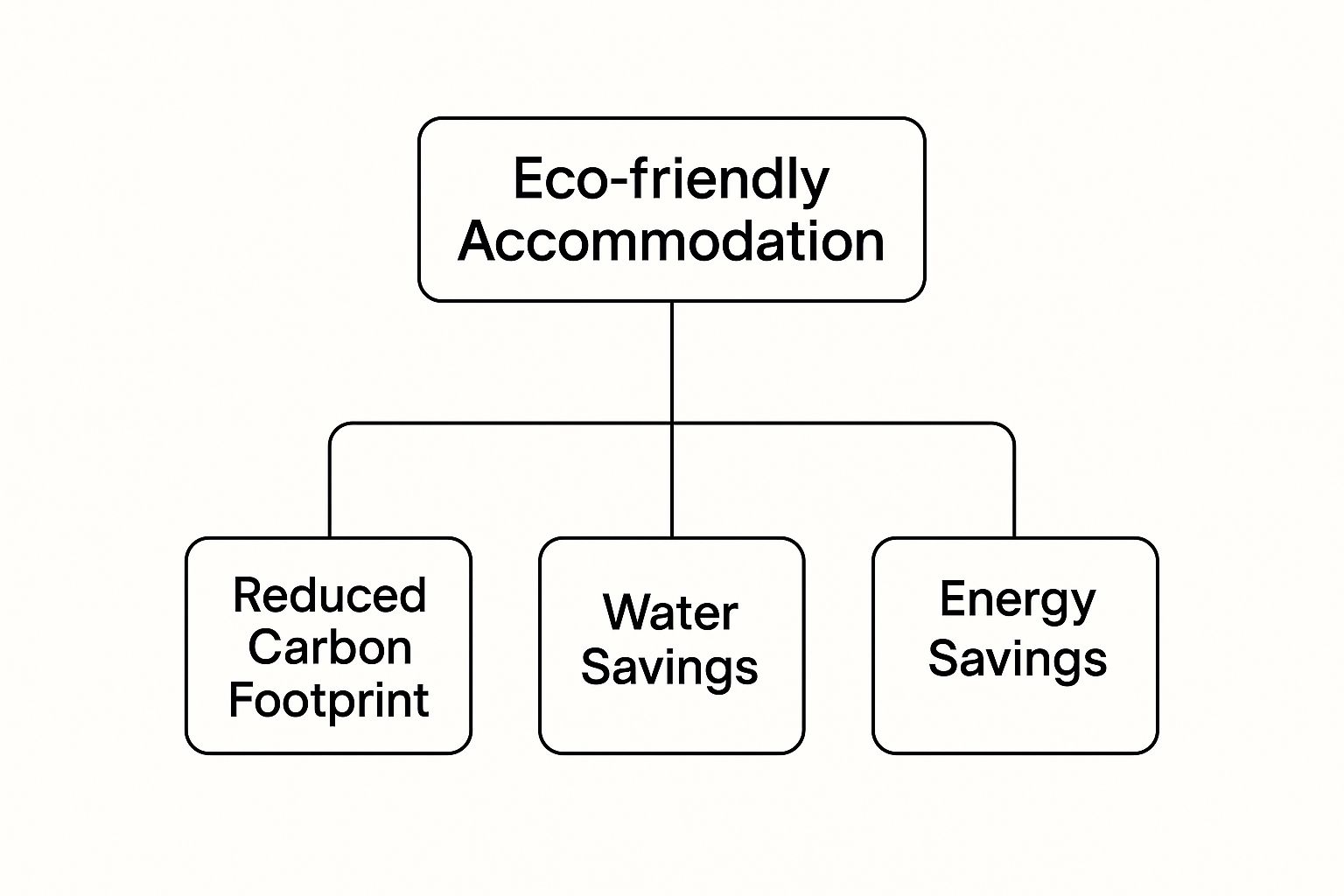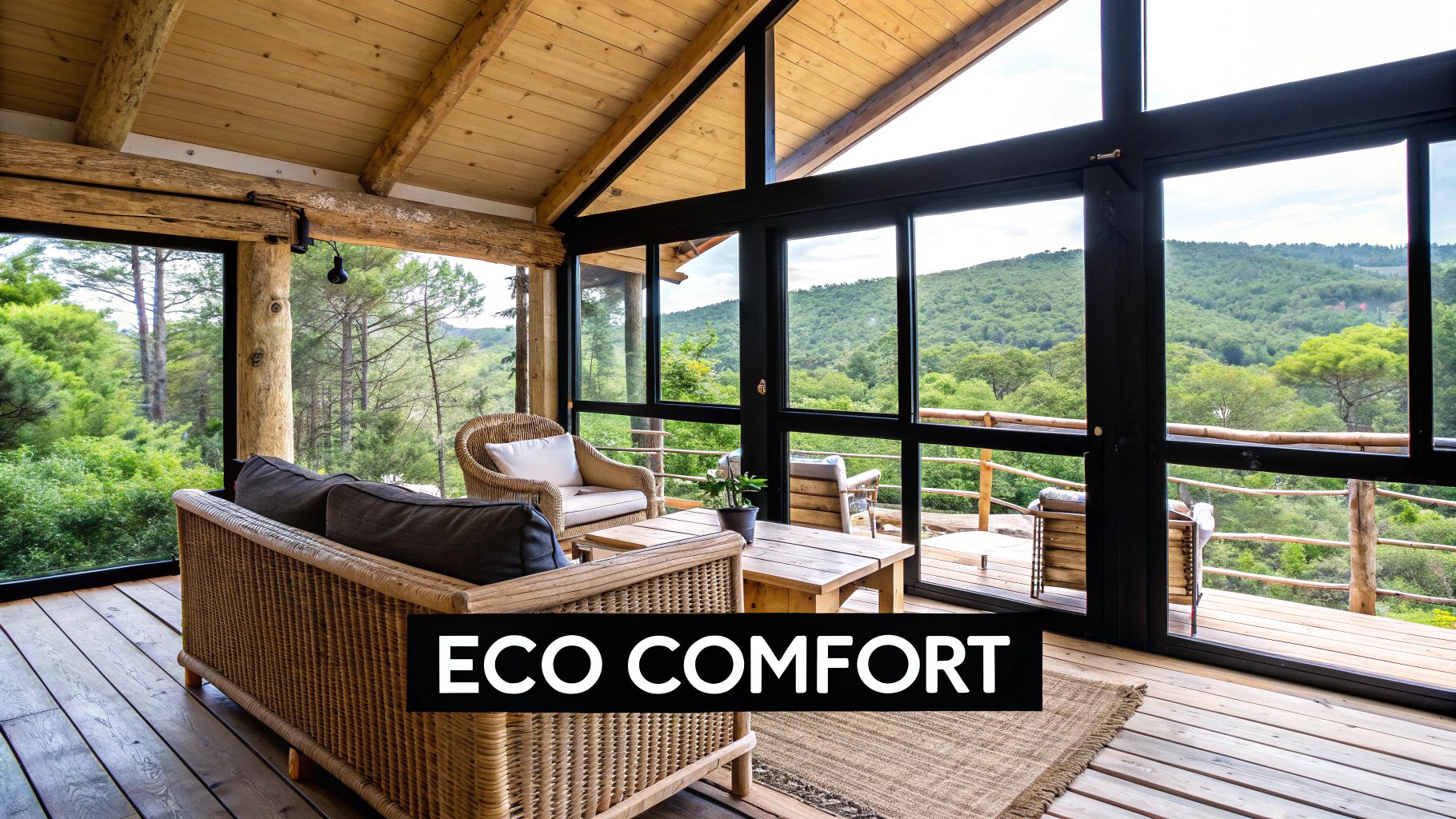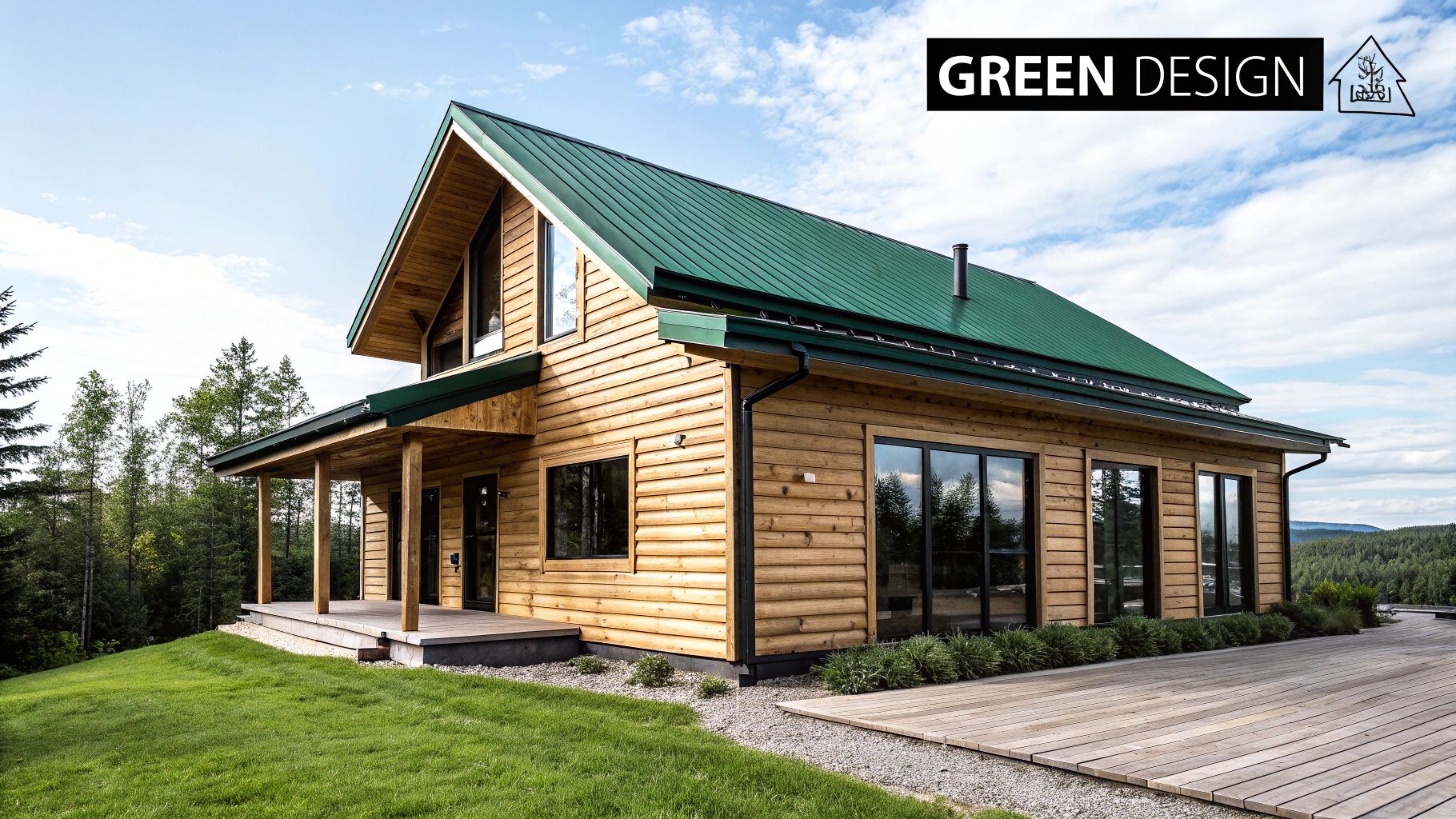Your Guide to Eco Friendly Accommodation
- Brendon Hayward
- Jul 30, 2025
- 15 min read
When we talk about eco-friendly accommodation, we're not just talking about a hotel that asks you to reuse your towels. We're talking about a place to stay that's been thoughtfully designed to leave the lightest possible footprint on our planet. It’s all about putting energy efficiency, water conservation, and waste reduction at the heart of the experience, giving you a way to holiday well while doing good.
The Shift to Sustainable Stays
Something big is happening in travel. It wasn’t so long ago that booking a holiday came down to three things: price, location, and maybe a pool. But now, a growing number of us are looking beyond the surface, asking bigger questions about the real impact of our stays. It’s part of a much wider awareness, where the story behind something matters just as much as the thing itself.
Think about the way many of us now shop for food. We'll often choose a local farm shop over a giant supermarket because we want that connection. We want to know where our food comes from, support the people who grow it, and get something that feels more authentic. Exactly the same thing is happening with travel. People are seeking out eco-friendly accommodation for that same sense of connection and responsibility. They want their holiday to benefit the local community and help protect the very landscapes they’ve travelled to enjoy.
Why Conscious Travel Is Gaining Momentum
This isn't just a fleeting trend. It’s a genuine shift in what people value, and it’s setting a new standard for the entire travel industry. As more of us become aware of our own environmental impact, we naturally want the choices we make—including where we holiday—to align with our values. And the benefits are clear for everyone.
So, what’s really driving this change?
Greater Environmental Awareness: With climate change in the headlines, more people are thinking about their carbon footprint and actively looking for holidays that tread a little lighter on the earth.
A Desire for Authentic Experiences: Eco-stays are often deeply rooted in their local surroundings and culture. This offers a far richer, more memorable experience than a soulless, one-size-fits-all hotel chain.
Support for Local Economies: When you choose a genuinely eco-conscious place, your money often goes directly to local families, craftspeople, and producers, helping the community you’re visiting to thrive.
The modern traveller gets it: our choices matter. Opting for a sustainable stay is a vote for a healthier planet and a fairer kind of tourism—one that respects both the people and the place.
This guide is here to help you navigate this exciting new world of travel. We’ll break down what really makes accommodation eco-friendly, show you how to spot the genuine article from the green-washers, and share inspiring examples—like our very own Fell Farm Hideaway—that live and breathe these principles every single day. Your journey towards more meaningful travel starts right here.
What Defines Eco-Friendly Accommodation?
The term ‘eco-friendly accommodation’ gets thrown around a lot these days. It can feel a bit vague, sometimes used more as a marketing buzzword than a genuine promise. So, what does it really mean when a place claims to be eco-friendly?
Think of it less as a simple label and more like a healthy, self-sufficient ecosystem. Every element, from the building itself to the way it’s run, works in harmony to minimise waste and tread lightly on the planet.
At its heart, truly eco-friendly accommodation is built on a foundation of real, tangible actions. It’s a deep commitment to operating in a way that actively protects the environment, supports the local community, and offers you a stay that’s both responsible and restorative. This goes far, far beyond just asking you to reuse your towels.
This shift towards genuine sustainability isn't just a niche interest anymore; it's a huge factor in how people travel. In fact, 32% of British consumers say their travel plans are influenced by environmental concerns. Even more telling, 36% are willing to pay more for a stay that’s genuinely sustainable – a number that's steadily climbing, especially among younger travellers.
The Foundational Principles of Green Stays
To cut through the greenwashing, it helps to understand the key pillars that support any truly eco-conscious property. These principles are what turn good intentions into real-world impact. They’re the benchmarks you can use to see if a place is truly walking the walk.
To really break it down, here are the core pillars that define sustainable lodging and what they look like in practice.
| The Core Pillars of Sustainable Lodging | | :--- | :--- | :--- | | Core Pillar | Key Practices | Positive Impact | | Energy Efficiency | High-grade insulation, double-glazed windows, and using renewable energy sources like solar panels. | Reduces the property's carbon footprint and reliance on fossil fuels. | | Water Conservation | Installing low-flow toilets and showers, harvesting rainwater for gardens, and using water-recycling systems. | Protects a precious resource, especially in water-scarce areas, and lowers overall consumption. | | Waste Reduction | Eliminating single-use plastics, providing excellent recycling and composting facilities, and choosing products with minimal packaging. | Dramatically cuts down on landfill waste and pollution from plastics. | | Sustainable Sourcing | Using local, recycled, or sustainable building materials, furnishing with items from local artisans, and serving food from nearby farms. | Supports the local economy, reduces transport emissions, and gives you a real taste of the place. |
These pillars aren't just a checklist; they're a mindset. They all work together to create a stay that’s better for the planet.
This is how those practical steps add up to make a real difference.

As you can see, the goal is simple: to create a stay with a much lighter environmental footprint by making specific savings in energy, water, and waste.
Beyond the Basics to a Deeper Commitment
While these foundations are crucial, a truly deep commitment often reveals itself in the smaller details and the overall spirit of a place. It’s about creating a culture of sustainability that you can feel throughout your stay. For a closer look at this philosophy, you might like our guide to sustainable tourism in the UK.
True eco-friendly accommodation isn’t just about having a few green features. It's a holistic approach where every decision—from the type of lightbulbs used to the soap provided in the bathroom—is made with the planet in mind.
This means looking for places that are open and honest about what they do. Do they share their environmental policy? Do they talk with passion about their conservation efforts, like protecting local wildlife habitats or rewilding projects?
It's this level of detail and genuine enthusiasm that separates the true pioneers from those just following a trend.
Spotting Genuine Sustainable Features

As more of us look for thoughtful ways to travel, the term ‘eco-friendly’ has become a big deal. The trouble is, it's also a powerful marketing buzzword. This can make it tricky to tell the difference between a place that's genuinely committed to the planet and one that’s just "greenwashing"—using a few green-sounding claims to look better than it is.
So, how do you find the real deal? You have to become a bit of a sustainability detective. It means looking beyond the brochure and knowing what practical, tangible features signal a true commitment.
Think of it like inspecting a classic car. You wouldn’t just admire the shiny paintwork; you’d want to look under the bonnet. The same goes for your accommodation – you need to check the "engine room" of its green credentials.
Looking Beyond the Towel Reuse Sign
The first step is to move past the most obvious (and easiest) green gestures. While asking guests to reuse towels and linens is a positive step, it’s really the bare minimum. A truly sustainable place weaves eco-friendly practices into its very fabric.
So, what are the concrete signs of a deeper commitment?
Renewable Energy Sources: Are there solar panels on the roof or a wind turbine in a nearby field? Do they mention generating their own power or using a dedicated green energy supplier? This is a serious investment and a clear sign of dedication.
Serious Water Conservation: Look for more than just a low-flow showerhead. Do they talk about rainwater harvesting systems for the gardens or, even better, advanced greywater recycling to reuse water from sinks and showers?
A Proper Waste System: A single recycling bin doesn’t cut it. True eco-leaders have a well-organised system for separating everything—glass, paper, plastic, and food scraps for compost. They’ll be proud to tell you about their efforts to minimise waste.
A War on Single-Use Plastics: This is a huge one. Have they ditched the tiny plastic toiletry bottles for refillable dispensers? Is there filtered tap water in glass bottles instead of plastic ones? Are things like coffee pods and plastic-wrapped biscuits nowhere to be seen?
These features show that sustainability isn't just a gimmick; it’s built into how the place runs every single day.
The Power of Local and Social Sustainability
A truly holistic approach to eco-friendly accommodation goes beyond just environmental practices. It’s also about a deep commitment to the local community and economy. This social side of sustainability is just as vital.
A property’s relationship with its local community is often the most telling sign of its authenticity. When a business invests in its neighbours, it shows a long-term commitment to the well-being of the place you are visiting.
Look for signs that the accommodation actively champions its local area. For instance, a property that is part of a family farm committed to conservation will have sustainability built into its very DNA.
Here are a few things to watch for:
Locally Sourced Food: Does the welcome basket or menu highlight produce from nearby farms, bakeries, and makers? This reduces "food miles" and directly supports local families.
Support for Local Artisans: Are the furnishings, artwork, or pottery made by local craftspeople? This gives the property a unique character and keeps money circulating within the community.
Hiring Local Staff: Employing people from the surrounding area is a powerful way to support the local economy and ensures staff have a real connection to and knowledge of the region.
This focus on all things local is a growing priority for travellers. A recent survey found that for 48% of UK luxury travellers more likely to choose sustainable hotels, locally sourced food was the top factor (70%), followed closely by efforts to reduce food waste and plastic.
By looking for these deeper, more meaningful features, you can confidently tell the genuinely eco-friendly stays from the superficial imitators—and know your choice is making a real, positive impact.
The Real Benefits of Choosing Green Stays
Opting for an eco-friendly stay isn't just a box-ticking exercise to feel good. It’s a powerful choice with real, tangible benefits that ripple outwards, touching you, the planet, and the local communities you explore. It’s a genuine win-win, turning your holiday from a simple getaway into something genuinely positive.
The benefits often start with you. Many green stays are focused on creating a healthier space, using natural, non-toxic cleaning products and steering clear of harsh chemicals. This often means better air quality and a far more comfortable stay, especially if you have allergies or sensitivities. Even more than that, these places offer a much deeper connection to the local landscape and culture – a feeling often lost in big, anonymous hotels.
Think about it. Waking up to the sound of birdsong from a protected woodland, not city traffic. Enjoying a breakfast made with eggs from the farm just outside your window. This isn't just a holiday; it's an experience rooted in a specific place, offering a true sense of peace and belonging.
A Win for Your Wellbeing
Your choice directly feeds your own sense of wellness. We all know that being closer to nature is good for us, with proven benefits for both mind and body. It reduces stress and lifts our mood. Eco-stays are often found in beautiful, quiet settings, designed to help you disconnect from the daily grind and reconnect with the natural world.
This focus on a restorative experience offers a different kind of luxury – one based on quiet, authenticity, and space. It’s a chance to slow down and appreciate the simple things, which is one of the many wonderful benefits of countryside breaks for every traveller.
The result is a stay that not only feels ethically sound but also directly contributes to a more relaxing and memorable holiday.
A Powerful Impact on the Planet
Beyond the personal perks, booking eco friendly accommodation makes a significant, positive mark on the environment. Every green stay you choose is a vote for a more responsible way to travel. These aren't just abstract ideas; they are measurable, vital contributions to preserving our planet.
Here’s how your choice makes a difference on a bigger scale:
Conserving Natural Resources: Green properties are smart with their resources. They use less water through low-flow taps and rainwater harvesting, and consume less energy thanks to renewable sources and better insulation. This actively reduces the strain on the local environment.
Reducing Your Carbon Footprint: Let's be honest, travel has a carbon cost. But by choosing a place powered by solar panels or built with sustainable timber, you're directly helping to lower the overall emissions of your trip.
Protecting Biodiversity: Many eco-conscious properties, especially rural ones like Fell Farm Hideaway, are deeply involved in conservation. They manage their land to protect local wildlife, plant native trees, and create habitats where local plants and animals can thrive.
When you stay at a place committed to sustainability, you're not just a guest; you become a partner in their conservation efforts. Your visit helps fund and validate their work to protect the local environment for generations to come.
Supporting Thriving Local Communities
Finally, one of the most rewarding benefits is the knock-on effect for the local community. A true eco-stay isn't an isolated bubble; it's woven into the fabric of its surroundings, acting as a hub for the local economy.
Your stay supports a whole network of local people. This could be the farmer who supplies the breakfast sausages, the artisan who crafted the furniture in your cabin, or the local guide who shares their passion for the area. By choosing an independent, eco-conscious property, you ensure more of your holiday spending stays right there in the community, helping it to flourish. This builds a fairer, more sustainable kind of tourism where the benefits are shared by everyone, not just a distant corporation.
Inspirational Examples of UK Eco Accommodation

It’s one thing to talk about sustainability in theory, but seeing it in action is where things get really inspiring. All across the UK, a growing number of places are proving that a deep commitment to the planet can go hand-in-hand with an unforgettable stay. These aren't just places to sleep; they're living, breathing examples of what truly thoughtful, eco friendly accommodation can be.
By taking a closer look at a real-world leader in the field, we can see how abstract principles become tangible practices. It shows what's possible when a genuine passion for the environment is the real driving force behind a business.
A Case Study in Sustainable Hospitality: Fell Farm Hideaway
Nestled in the rolling Northumberland hills, Fell Farm Hideaway is a testament to what can be achieved when sustainability is a core value, not just a box-ticking exercise. It's more than a collection of beautiful cabins; it's an extension of a family-run farm where conservation and a love for the land are woven into the fabric of daily life.
The journey to becoming an eco-pioneer wasn't about jumping on a trend. It came from a heartfelt desire to share a stunning corner of the world while actively working to protect it. You can see this ethos in every decision, from the materials used to build the cabins to the local partnerships that make a stay here so special.
What really sets a place like Fell Farm apart is the holistic approach. It’s not about a single 'green' feature, but a whole system of thoughtful choices working together in harmony.
True sustainability is a story, not a statistic. It’s found in the details—the preserved wildflower meadow, the locally crafted furniture, and the quiet hum of a business that respects its natural surroundings.
This approach creates a getaway that feels both authentic and responsible, connecting visitors to the landscape in a deep and meaningful way.
Tangible Practices in Action
So, what does this look like on the ground? Let's break down the specific, practical steps that make this kind of eco-friendly accommodation so special. These are the real-world applications of the principles we've discussed, demonstrating a full-circle commitment to the environment and the local community.
Energy and Resource Management While the cabins offer all the comforts you’d want from a luxury getaway, the philosophy underneath is all about resourcefulness and respect for nature. This includes:
Thoughtful Construction: Cabins are built with sustainability at their heart, using materials that minimise environmental impact and designs that blend seamlessly into the landscape.
Biodiversity as a Priority: The farm itself is actively managed to help nature flourish. This means creating and protecting habitats for local wildlife, from barn owls to deer, and nurturing ancient woodlands and native plants.
Community and Local Sourcing A huge part of the mission is strengthening the local economy. This is achieved by:
Championing Local Producers: Welcome baskets and recommendations point guests towards nearby farm shops, bakeries, and artisans. This reduces food miles and, just as importantly, supports other small, local businesses.
Fostering Local Connections: The business actively encourages visitors to explore Northumberland's rich heritage, from Hadrian's Wall to cosy local pubs, ensuring the benefits of tourism are felt throughout the community.
If this approach inspires you, our guide to other unforgettable eco cabins in the UK is packed with more fantastic options for planning your next green getaway.
What We Can Learn from Eco-Pioneers
Examples like Fell Farm Hideaway offer a powerful blueprint for the future of travel. They show us that luxury and comfort don't need to be sacrificed for the sake of sustainability. In fact, they prove that a real connection to nature and a commitment to doing things right can be the ultimate luxury.
These pioneers remind us that our choices as travellers have real power. By supporting properties that are genuinely invested in protecting their environment and propping up their communities, we all contribute to a more positive and responsible kind of tourism. They're tangible proof that a holiday can be restorative for both the guest and the destination itself.
How to Find and Verify Eco Friendly Stays
So, you know what real eco-friendly travel looks like in principle. Now for the exciting part: finding it. With so many places claiming to be ‘green’, it takes a bit of savvy to confidently book an authentic eco friendly accommodation. Think of it less like a chore and more like being a thoughtful detective.
You wouldn't buy a new bit of kit without checking the specs and reviews, right? The same diligence applies here. The good news is that you’re not alone. The demand for greener travel is really taking off. In Great Britain, around 35% of travellers now consider eco-friendly hotels to reduce their environmental footprint, a number that’s been on the rise since 2019. You can read more about how British travellers are prioritising sustainability on Statista.
Look for Reputable Certifications
Third-party certifications are your best friend here. They’re an independent stamp of approval, showing that a place has actually been checked against proper environmental and social standards. Basically, they do the heavy lifting for you.
Keep an eye out for logos from respected organisations like:
Green Tourism: A well-known UK-based scheme that looks at everything from energy use to community support.
EarthCheck: A global programme that uses hard data to measure a property's environmental performance against others.
B Corp Certification: This is a big one. It means a business is legally committed to high standards of social and environmental performance, accountability, and transparency.
Dig Deeper Than the Homepage
While a certificate is a great sign, it's always worth doing your own digging. A place that’s genuinely committed will be proud to tell you all about it.
Greenwashing is vague, but true commitment is transparent. Look for properties that openly share their sustainability journey, including their challenges and achievements. This honesty is often the clearest sign of authenticity.
Have a good look around their website. Is there a dedicated page about their eco-practices? Do they get specific about how they reduce waste, save water, or use renewable energy? The best places often weave their ethos into everything they do, like in this guide to the Northumberland National Park, which beautifully connects their sustainable practices to the surrounding landscape.
And don't forget to read guest reviews with a keen eye. Previous visitors are brilliant at spotting the small, meaningful details that show a place truly walks the walk.
A Few Common Questions

It’s only natural to have a few questions when you start exploring the world of sustainable travel. It’s a term that means a lot of different things to different people. Here are our thoughts on some of the most common queries we hear, to help you book your next trip with a clear conscience.
Does an Eco-Stay Have to Be Expensive?
Not at all. While you'll find some incredible luxury eco-lodges with a price tag to match, the world of eco-friendly accommodation is wonderfully varied. It covers everything from budget-friendly campsites and rustic cabins to smart guesthouses that have simply invested in more efficient ways of doing things.
Often, the savings these places make on energy and water bills can help them keep prices competitive, so you're not always paying a premium for their principles.
What's the Difference Between 'Green' and 'Sustainable'?
These two get used interchangeably all the time, but there’s a subtle and important difference. We like to think of it like this:
Green or Eco-Friendly: This is usually about specific, direct actions that help the environment. Think solar panels, reducing plastic, or harvesting rainwater. It’s focused squarely on the environmental impact.
Sustainable: This is the bigger picture. It definitely includes being ‘green’, but it also pulls in social and economic threads. A truly sustainable place doesn't just protect the planet; it supports its local community, provides good jobs, and is built to be a positive presence for the long haul.
How Can I Be a More Thoughtful Guest?
Wherever you stay, your own habits can make a huge difference. You don’t have to do anything drastic; a few simple actions can dramatically lighten your holiday footprint and show respect for the place you’re visiting.
Being a conscious traveller is about extending the good habits you have at home to your holiday. Small, mindful actions add up to a significant positive impact, respecting both the place and its people.
Here are a few easy ways to play your part:
Pack Light: A lighter suitcase means lower fuel consumption for planes and cars. Simple as that.
Respect Local Resources: Be mindful of your water and electricity use. Turn off lights and taps, just as you would at home.
Shop and Eat Locally: Support the local economy by visiting nearby farm shops, markets, and independent restaurants. It’s the best way to get a real taste of the area.
Leave No Trace: When you’re out exploring nature, stick to the paths and take all your litter home with you.
Ready to experience a stay that’s good for the soul and gentle on the planet? At Fell Farm Hideaway, we blend comfort, nature, and a deep-rooted commitment to sustainability.
Discover our peaceful cabins and book your Northumberland escape at https://www.fellfarmhideaway.com.
Comments